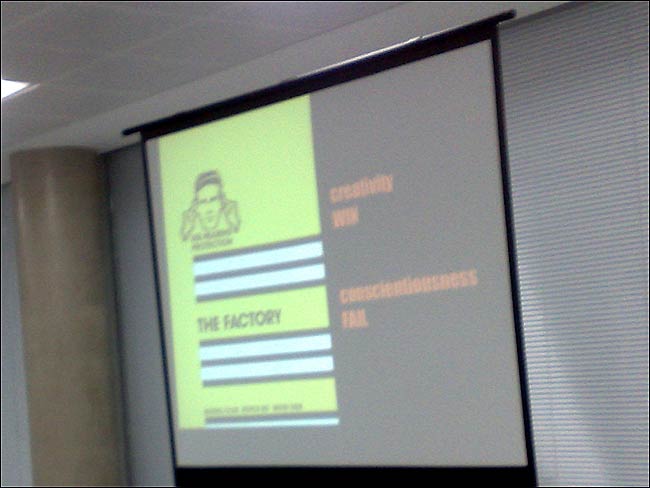"Psychology Of Creativity" - Claire Rowland at London IA
A couple of weeks ago we held another of our London IA evenings, with a series of talks looking at innovation and creativity. The night was sponsored by Zebra People and Lab49, and kindly hosted by The Team. So far I've blogged my notes from Richard Rutter's talk about web typography, and from Glenn Jones talking about digital identity. Today I wanted to post my notes from Claire Rowland's talk.
"Psychology Of Creativity" - Claire Rowland
Claire Rowland was presenting about the "Psychology Of Creativity" - specifically what makes people think they are 'creative', and how those of us who don't consider ourselves 'creative' can nurture it. Part of Claire's interest came from being, like many of us, in a work environment when 'creativity' is highly prized.
She started out by stressing that she wasn't going to talk about some well established schools of thought about psychology, like different coloured hats or 'right-brain and left-brain' thinking. She argued that 'pseudoscience' can be persuasive when it tells us what we want to hear, or proposes a model that neatly fits our preconceptions, without having too have much evidence behind it. She also made a great point - that science very often proves "the bleedin' obvious". It is usually only proving the counter-intuitive that makes headlines, but proving the obvious is no less important.
Claire said that creativity is often measured by how many ideas you have - e.g. "can you think of 500 different ways to use a brick?" type questions. However, in the real world, and particularly in the commercial world, it isn't about how many ideas you can have, it is about them being appropriate ideas. For Claire, the creative process wasn't just about the 'bit in the middle' where you derive a solution, but also about the bit beforehand, where you pick a good problem to solve, and the bit afterwards, where you implement the solution.
Claire scored pop culture credibility points with me by telling a story about Peter Saville's design of a poster for one of the first Factory nights in Manchester. One key trait of creative people was to pay attention to detail, but also lack conscientiousness. Saville had produced a brilliant design, but let himself down on the conscientiousness front by not delivering it until the night of the show. Claire let herself down in the cred stakes by following up that cool slide with a picture of Mr Motivator.

She finished the presentation by running through some tips for increasing creativity. The ones that stood out for me were enjoying what you do, making sure that you take breaks to give your unconscious mind time to process a problem, and looking at green things. Although I'm sure the Daily Mail has identified 'green things' as giving you cancer.
For those interested in exploring the topic further, Claire recommended PsyBlog.
Next...
The final presentation of the evening was Andy Budd talking about the 'cult of innovation', and I'll be blogging my notes from that in due course.
The next event for UX/IA people in London that I'll be taking part in is "Content Strategy, Manhattan Style", which is on tonight. It features Karen McGrane, Rachel Lovinger and Jeffrey MacIntyre who will all be visiting us from the USA. The venue is The Book Club in Shoreditch. You can, I believe, still register to go on the waiting list for tickets here, and you can ask a question in advance by using the hashtag #cslondon on Twitter.
“London IA: Notes from the talks”
Martin Belam, foreword by Ann McMeekin Carrier
London IA is a network of designers, information architects and thinkers. Since 2009 the group has been holding regular meetings featuring talks about UX, or of interest to UXers. This ebook is a compilation of my notes from those evenings, featuring talks by Andy Budd, Giles Colborne, Cennydd Bowles, Claire Rowland, Jason Mesut, Ben Bashford, Chris Heathcote, Dan Lockton, Relly Annett-Baker, Michael Blastland, Margaret Hanley and Richard Rutter amongst others. Topics covered range from ubicomp to psychology, from learning how to sketchnote to how to write a UX book, and how to improve digital design through diverse routes like copy-writing, designing for doubt, learning from music technology or taking care of typography.
“London IA: Notes from the talks” is available for Kindle for £2.47.

Creativity is the byproduct of having a sense of purpose. Creative solutions to vexing problems present themselves when you're dead serious about finding a solution. It's not quite a "flash of genius" but more of an inevitability.